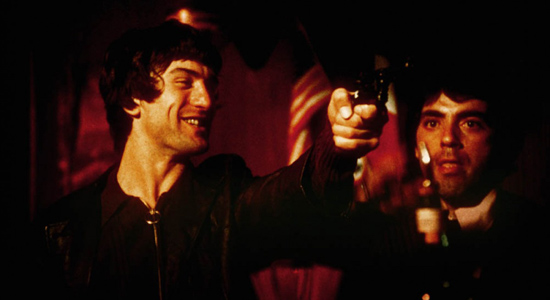MAGNET contributing writer Jud Cost is sharing some of the wealth of classic films he’s been lucky enough to see over the past 40 years. Trolling the backwaters of cinema, he has worked up a list of more than 500 titles—from the silent era through the ’90s—that you may have missed. A new selection, all currently available on DVD, appears every week.

Mean Streets (1973, 112 minutes)
To the casual viewer, the house-onfire success of David Chase’s TV series The Sopranos seemed to owe much to Francis Ford Coppola’s epic trio of mob movies beginning with The Godfather in 1972. In truth, it was one of Martin Scorsese’s first films, Mean Streets, that served as principal inspiration for Tony Soprano and his boys, almost three decades later. The Godfather movies dealt with crime as big and even bigger business, whereas Mean Streets and The Sopranos traveled the other way down the food chain to everyday life of the foot soldiers in the trenches. It was FDR’s New Deal carried beyond what might have been its logical extreme: Get America Moving, indeed.
Charlie (Harvey Keitel), a man with a leg up in his local family, collecting debts for his uncle Giovanni (Cesare Danova), awakens from a fitful sleep to the sound of God. Or it could be his own voice intoning: “You don’t make up for your sins in church. You do it in the street. You do it at home. The rest is bullshit and you know it.”
The film’s haunting intro continues with what might be the best three minutes in pop music history: Phil Spector’s wall-of-sound orchestra in all its drywall-rattling glory backing the Ronettes crooning “Be My Baby” over the most easily identifiable three-note drum-pattern, ever. A series of grainy home movies splashes Charlie’s family across the screen, from backyard birthdays, to baby Christenings and Saturdays spent in simple, religious-themed amusement parks.
Cut to fellow mafioso Tony (David Proval) discovering a junkie shooting up in his strip club’s rest room. He grabs the bum by the collar, walks him through the club, knocking over furniture, and shoves him out the front door. “Keep outta my place! I know your face?” he shouts. “George, whaddaya do here? You’re supposed to be a bouncer?!”
Later at the same joint, Charlie and Michael discuss the new boy Charlie’s brought on board, by all accounts a loose cannon who may need special handling. “I’d like to know what’s goin’ on in that kid’s head,” says Charlie. “I think you should care a little more about his payments,” says Michael (Richard Romanus). “I think the kid’s tryin’ to duck me. What happens if he doesn’t pay me? I gotta collect from you? I don’t wanna do that.” “You’re right. You don’t,” says Charlie, smiling broadly. Before long, Johnny Boy staggers in, wearing a heavy overcoat. He’s played by an impossibly young Robert De Niro, a kid who owes money to every loan shark in town. And he’s brought along a couple of bohemian chicks he’s just picked up in the Village. The time has come, sighs Charlie with the patience of a parish priest in the confessional, to give serious counsel to this fledgling.






